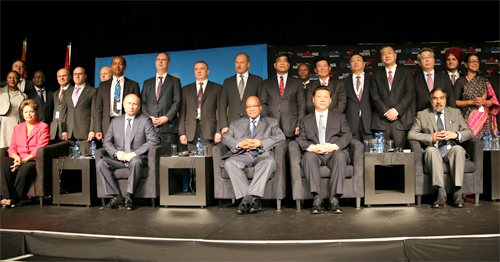The BRICS Business Council, a pivotal organisation established during the 2013 BRICS Summit in Durban, South Africa, is transforming the landscape of international trade and investment. Designed to foster collaboration amongst Brazil, Russia, India, China, and South Africa, this council aims to bridge gaps and streamline economic interactions across these emerging markets. By facilitating open dialogue between business communities and governments, the council not only identifies and resolves trade bottlenecks but also encourages innovative solutions for sustainable growth. As a business owner, understanding the implications of these developments can open doors to new markets and partnerships, positioning your enterprise at the forefront of global economic shifts. Join us as we explore how the BRICS Business Council can be a game-changer for your business strategy.

Introduction to BRICS Business Council
The BRICS Business Council represents a significant force in shaping global economic dynamics. Let’s explore its origins, objectives, and the key nations driving this influential group.
Origins and Objectives
The BRICS Business Council was established during the Fifth BRICS Summit in Durban, South Africa, in March 2013. Its primary objective is to create a platform that promotes and strengthens business, trade, and investment ties among the BRICS nations.
The council aims to facilitate regular dialogue between business communities and governments of BRICS countries. This open communication channel helps identify and address bottlenecks in economic cooperation.
By fostering collaboration, the BRICS Business Council seeks to enhance economic growth, encourage innovation, and promote sustainable development within member states. This collective approach allows BRICS nations to navigate global economic challenges more effectively.
Key Member Nations
The BRICS acronym represents five major emerging economies: Brazil, Russia, India, China, and South Africa. Each nation brings unique strengths and perspectives to the council.
Brazil, with its vast natural resources and strong agricultural sector, contributes significantly to global food security. Russia’s energy resources and technological expertise play a crucial role in the group’s strategic planning.
India’s rapidly growing IT sector and large consumer market offer immense potential for businesses. China, as the world’s second-largest economy, provides manufacturing prowess and investment capabilities.
South Africa, the most recent addition to the group, serves as a gateway to the African continent, offering valuable insights into emerging African markets.
Opportunities for Businesses
The BRICS Business Council opens up a world of possibilities for businesses looking to expand their horizons. Let’s examine how it enhances trade and investment while fostering innovation and development.
Enhancing Trade and Investment
The BRICS Business Council actively works to remove barriers to trade and investment among member nations. This effort creates a more conducive environment for businesses to operate across borders.
By promoting policy coordination, the council helps streamline regulations and procedures, making it easier for companies to navigate different markets. This harmonization reduces operational costs and risks associated with international expansion.
The council also facilitates networking opportunities, allowing businesses to connect with potential partners, suppliers, and customers across BRICS nations. These connections can lead to joint ventures, technology transfers, and market access agreements.
Moreover, the BRICS New Development Bank, established by the group, provides funding for infrastructure and sustainable development projects, creating opportunities for businesses in various sectors.
Fostering Innovation and Development
The BRICS Business Council places a strong emphasis on innovation as a driver of economic growth and competitiveness. It encourages collaboration in research and development across member nations.
Through various working groups, the council promotes knowledge sharing and technology transfer. This collaborative approach helps businesses stay at the forefront of technological advancements and industry trends.
The council also supports initiatives in areas such as digital economy, green technology, and sustainable development. These focus areas open up new markets and business opportunities for forward-thinking companies.
By aligning business interests with sustainable development goals, the BRICS Business Council helps companies contribute to social and environmental progress while pursuing economic growth.
Strategies for Business Engagement
To fully leverage the opportunities presented by the BRICS Business Council, businesses need to adopt strategic approaches. Here’s how to build stronger ties and navigate global challenges effectively.
Building Stronger Ties
Engaging with the BRICS Business Council requires a proactive approach. Here are some strategies to build stronger ties:
- Participate in BRICS forums and events to network with key stakeholders.
- Join working groups relevant to your industry to contribute to policy discussions.
- Collaborate with local partners in BRICS countries to gain market insights.
Building relationships with local chambers of commerce can provide valuable connections and information about business opportunities in BRICS nations.
Consider establishing a presence in BRICS countries through joint ventures or local subsidiaries. This approach can help you better understand local markets and regulations.
Invest in cultural understanding and language skills to facilitate smoother communication with BRICS partners. This investment can lead to more successful business relationships.
Navigating Global Challenges
The BRICS Business Council provides a platform for businesses to collectively address global economic challenges. Here’s how to leverage this advantage:
Stay informed about BRICS initiatives and policy recommendations. This knowledge can help you anticipate market trends and regulatory changes.
Participate in BRICS-led discussions on global issues such as trade tensions, climate change, and digital transformation. Your input can shape policies that affect your business.
Leverage the BRICS network to diversify your supply chain and reduce dependency on single markets. This strategy can enhance your business’s resilience to global economic shocks.
Explore opportunities in emerging sectors promoted by BRICS, such as renewable energy, digital economy, and sustainable infrastructure. These areas often receive support and funding from BRICS institutions.
By actively engaging with the BRICS Business Council and its initiatives, your business can not only navigate global challenges more effectively but also contribute to shaping a more inclusive and sustainable global economy.













